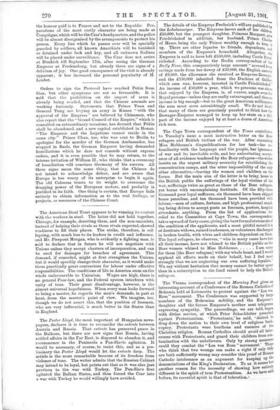The Cape Town correspondent of the Times contributes to Tuesday's
issue a most instructive letter on the Boer refugees and British victims of the war. After examining Miss Hobhouse's disqualifications for her task—her tin. familiarity with the language and the people, her ignorance of war and its inevitable evils, and her unhesitating accept. rules of all evidence tendered by the Boer refugees—the writer insists on the urgent military necessity for establishing the concentration camps, and the utter impossibility of the only other alternative,—leaving the women and children on the farms. But the main aim of the letter is to bring home to the British public the sufferings of the loyal victims of the war, sufferings twice as great as those of the Boer refugees, yet borne with uncomplaining fortitude. Of the fifty-three thousand poor loyal sufferers, six thousand have been shipped home penniless, and ten thousand have been provided with labour,—men of culture, fortune, and high professional stand. ing being driven to accept posts as foremen, porters, hospital attendants, anything. From the list of applications for relief to the Committee at Cape Town, the correspondent takes upward of forty cases, giving the bare formal statements of the condition of the applicants, and a most pitiful record it is of destitute widows, ruined tradesmen, or volunteers discharged in broken health, with wives and children dependent on them. The loyal refugees, he observes, " who in many cases have lost all their income, have not whined to the British public as the
Boer women whined to Miss Hobhouse I am sorry for them [the Boer refugees] with my whole heart, and I would applaud all efforts made on their behalf, but I feel most strongly that we are neglecting our own suffering loyalists." We say without hesitation that money cannot be better spent than in a subscription to the fund raised to help the British refuges.


































 Previous page
Previous page